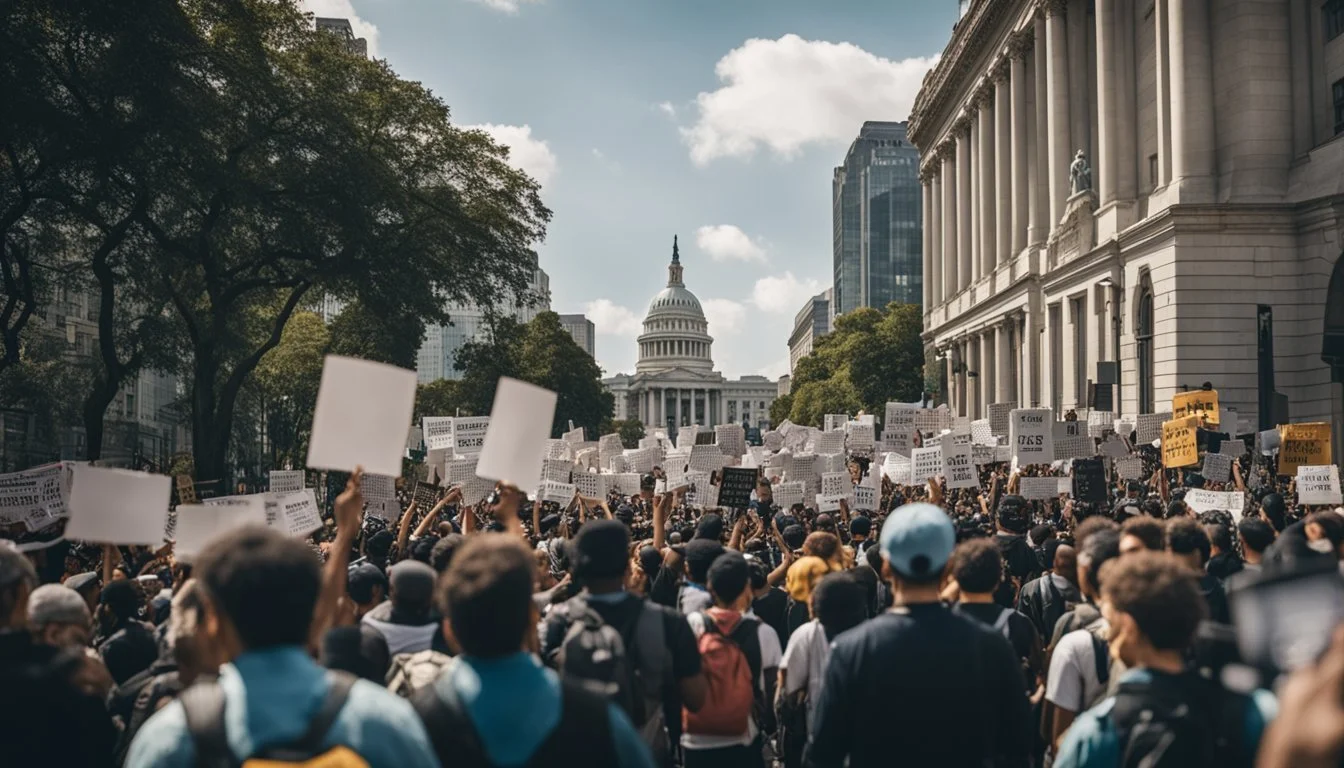Documentary Subject Nelma Kodama Exposes Brazilian Political Scandal on Camera
Nelma Kodama's story shines a spotlight on Brazil's complex web of financial corruption. As one of the country's most notorious money launderers, Kodama played a central role in high-profile scandals that rocked the nation's political and business elite. Her involvement in Operation Car Wash, a sprawling investigation that exposed widespread graft at state oil company Petrobras, brought her criminal activities to the forefront of public attention.
A new Netflix documentary, "Nelma Kodama: The Queen of Dirty Money," offers viewers an unprecedented look into the shadowy world of illicit finance. Released in June 2024, the film features Kodama herself, providing firsthand accounts of her dealings in Brazil's black market currency trade. This rare glimpse into the inner workings of financial crime serves as a powerful tool for understanding the scope and impact of corruption on Brazilian society.
Kodama's story intersects with some of Brazil's most significant corruption cases of the past two decades. Her connections to renowned dollar dealer Alberto Youssef and her attempts to flee justice underscore the far-reaching nature of these criminal networks. As cameras capture her unfiltered narrative, they also shed light on the broader issues of systemic corruption that continue to challenge Brazil's institutions and economy.
Nelma Kodama: The Queen of Dirty Money
Nelma Kodama gained notoriety as Brazil's most infamous black-market currency trader. Her involvement in large-scale money laundering and illegal foreign exchange operations earned her the moniker "Queen of Dirty Money."
Background and Rise to Infamy
Born in 1966, Nelma Kodama started her criminal career as a small-time offender. She quickly ascended the ranks of Brazil's underworld, becoming a key player in international drug trafficking and corruption schemes.
Kodama's expertise in moving large sums of money across borders caught the attention of powerful criminal organizations. Her network expanded rapidly, connecting her to high-level politicians and business executives.
By the early 2000s, Kodama had established herself as a go-to person for laundering illicit funds. Her operations grew increasingly sophisticated, utilizing shell companies and offshore accounts to conceal the origins of dirty money.
Illegal Foreign Exchange Operations
Kodama's primary business was running a vast illegal foreign exchange network. She specialized in facilitating unauthorized currency transactions, particularly dealing in U.S. dollars.
Her operation allowed clients to move money in and out of Brazil without detection, bypassing strict currency controls. This service proved invaluable to corrupt officials and criminals seeking to hide their ill-gotten gains.
Kodama's methods included using front businesses, manipulating import-export invoices, and employing a team of couriers to physically transport cash across borders. Her intricate knowledge of financial systems helped her stay ahead of authorities for years.
In 2014, Kodama's empire crumbled when she was arrested as part of Operation Car Wash, Brazil's largest anti-corruption investigation. She was convicted on charges of corruption, illegal foreign exchange, and involvement in a criminal organization.
Brazilian Corruption Scandals
Brazil has faced numerous high-profile corruption scandals in recent years, shaking the nation's political and economic foundations. These scandals exposed widespread graft involving politicians, businesses, and state-owned enterprises.
Operation Car Wash and Petrobras
Operation Car Wash, launched in 2014, uncovered a massive corruption scheme centered around Petrobras, Brazil's state-owned oil company. The investigation revealed a complex network of bribes, kickbacks, and money laundering involving construction firms, politicians, and Petrobras executives.
Key figures implicated included former presidents Luiz Inácio Lula da Silva and Dilma Rousseff. The scandal led to the arrests of numerous business leaders and politicians. Petrobras suffered significant financial losses, with billions of dollars siphoned off through inflated contracts and bribes.
Nelma Kodama, known as the "Queen of Dirty Money," played a role in the currency exchange aspect of the scandal. She was sentenced to 18 years in prison for corruption and involvement in a criminal organization.
Impact on Brazilian Society and Politics
The corruption scandals had far-reaching consequences for Brazil:
Erosion of public trust in government institutions
Economic downturn and job losses
Rise of anti-establishment sentiment in politics
The scandals sparked widespread protests and calls for political reform. They also contributed to the election of Jair Bolsonaro in 2018, who campaigned on an anti-corruption platform.
Efforts to Combat Corruption
Brazil has taken steps to address systemic corruption:
Strengthening anti-corruption laws
Enhancing transparency in government contracts
Improving corporate governance standards
However, recent developments have raised concerns about the longevity of these efforts. The Supreme Court has overturned some Car Wash convictions, including that of former chief of staff José Dirceu.
Justice José Antonio Dias Toffoli has been criticized for decisions that appear to undermine the legacy of Operation Car Wash. This has led to fears that progress in fighting corruption may be stalling or even reversing in Brazil.
Arrest and Legal Proceedings
Nelma Kodama's criminal activities culminated in her arrest, trial, and subsequent legal challenges. Her case shed light on Brazil's complex web of financial crimes and corruption.
Capture and Charges
In April 2014, Brazilian federal police arrested Nelma Kodama as part of Operation Car Wash, a massive anti-corruption investigation. Authorities apprehended her at São Paulo International Airport as she attempted to leave the country. Kodama faced charges of money laundering, tax evasion, and participation in a criminal organization.
Prosecutors accused her of operating a sophisticated currency exchange scheme that facilitated illegal transactions for politicians and businesses. Evidence suggested she handled millions of dollars in illicit funds, earning her the moniker "Queen of Dirty Money."
Trial and Sentence
Kodama's trial began in late 2014. The prosecution presented extensive evidence, including wiretapped phone conversations and financial records. In a surprising turn of events, Kodama sang during her testimony, drawing media attention to the proceedings.
In May 2015, the court found Kodama guilty on multiple charges. The judge sentenced her to 18 years in prison for money laundering and other financial crimes. Additionally, the court ordered her to pay substantial fines.
Post-Arrest Developments
Following her conviction, Kodama initially served time in a closed prison regime. In 2016, authorities transferred her to house arrest with an electronic ankle bracelet due to health concerns.
In 2019, Kodama received a partial pardon, reducing her sentence. This decision sparked controversy and public debate about the Brazilian justice system's handling of white-collar crimes.
In 2023, police arrested Kodama again in Lisbon, Portugal, on suspicion of involvement in an international cocaine trafficking operation. This new case added another layer to her complex legal history.
Nelma Kodama in Popular Media
Nelma Kodama's notoriety in Brazil's corruption scandals has made her a subject of interest in popular media. Her story has been featured in streaming services and sparked discussions across various platforms.
Netflix Documentary Feature
Netflix released a documentary titled "Nelma Kodama: The Queen of Dirty Money" on June 6, 2024. Directed by João Wainer, the 94-minute film explores Kodama's role in major Brazilian corruption cases. The documentary features Kodama herself, offering viewers a firsthand account of her involvement in illicit financial activities.
The film delves into Kodama's past as a black-market currency trader and her subsequent cooperation with authorities. It sheds light on the complex web of corruption that entangled Brazilian politics and business in the early 2000s.
Press and Public Reaction
The release of the Netflix documentary sparked significant media attention. Critics and viewers alike engaged with the film's content, leading to discussions about corruption in Brazil. Social media platforms buzzed with conversations about Kodama's story and its implications for Brazilian society.
Several news outlets, including Decider and The Cinemaholic, published reviews and articles about the documentary. These pieces often focused on Kodama's unapologetic demeanor and the film's portrayal of her criminal activities. The documentary's release reignited public interest in the corruption scandals that had rocked Brazil years earlier.
Global Ties and International Ramifications
Nelma Kodama's criminal activities extended far beyond Brazil's borders, implicating networks across Europe. Her case highlights the transnational nature of financial crimes and drug trafficking operations.
Links with Italian and Portuguese Entities
Kodama cultivated connections with criminal organizations in Italy and Portugal. These relationships facilitated the movement of illicit funds and narcotics across continents. Italian authorities identified links between Kodama's network and mafia groups operating in Sicily and Calabria.
In Portugal, Kodama established a presence in Lisbon's financial district. She leveraged contacts in Portuguese banks to launder money from Brazilian corruption schemes. These ties proved crucial for expanding her illegal currency trading operations internationally.
International Operations and Arrests
Operation Discovery, a joint effort by Brazilian and Portuguese law enforcement, targeted Kodama's global network. In April 2024, Portuguese police arrested Kodama at a luxury hotel in Lisbon. She faced charges of drug trafficking and money laundering.
The arrest came as part of a broader crackdown on cocaine smuggling routes from South America to Europe. Brazilian authorities worked closely with Interpol to track Kodama's movements across borders. Former Brazilian President Michel Temer had previously reduced Kodama's 18-year sentence for corruption, sparking controversy over political interference in judicial processes.
Personal Story and Character Insights
Nelma Kodama's life reflects extravagance and controversy. Her involvement in financial scandals intertwines with a lavish lifestyle and complex personal affairs.
Lifestyle and Personal Affairs
Kodama's penchant for luxury was evident in her possessions. She owned expensive jewelry and private planes, showcasing her wealth acquired through illicit means. Her connections extended to criminal organizations like the First Capital Command. In one incident, Kodama reported stolen jewelry valued at €200,000, highlighting the scale of her affluence.
Her lifestyle attracted scrutiny from law enforcement. Allegations of involvement in drug smuggling surfaced, adding another layer to her criminal profile. These accusations painted a picture of a woman deeply entrenched in various illegal activities.
Interviews and Personal Accounts
In recent interviews, Kodama has begun to share her perspective on the corruption scandal. She offers firsthand accounts of her role in Brazil's financial underworld. These revelations provide insight into the inner workings of currency trading schemes and high-level corruption.
Kodama's personal accounts shed light on her motivations and experiences. She describes the pressures and allures of the black market currency trade. Her cooperation with authorities following her arrest has led to reduced prison time, suggesting a complex relationship with the justice system.
Social and Cultural Impact
Nelma Kodama's case spotlighted women's roles in high-level financial crimes and sparked public debates about corruption in Brazil. Her notoriety challenged stereotypes and reshaped perceptions of criminal networks.
Perception of Women in Crime
Kodama's prominence in a male-dominated criminal world challenged traditional gender roles. As a key figure in currency exchange schemes, she broke stereotypes about women's involvement in white-collar crime. Her case highlighted how women could occupy powerful positions within criminal organizations.
Kodama's flamboyant lifestyle and unapologetic attitude garnered significant media attention. This coverage sparked discussions about gender dynamics in criminal networks. It raised questions about how women navigate and succeed in illicit financial operations traditionally controlled by men.
Influence on Public Discourse
Kodama's case became a focal point in Brazil's national conversation about corruption. Her high-profile arrest and subsequent legal battles kept the issue of financial crimes in the public eye. Social media amplified discussions, with many Brazilians expressing outrage over the scale of corruption exposed.
The electronic monitoring ankle bracelet Kodama wore became a symbol of white-collar crime accountability. It sparked debates about appropriate punishments for financial crimes. Her case contributed to growing public demands for stronger anti-corruption measures and greater transparency in Brazil's financial systems.
Kodama's involvement in bribery schemes involving politicians and businesses exposed the intricate web of corruption in Brazilian society. This revelation deepened public mistrust in institutions and fueled calls for systemic reforms.





